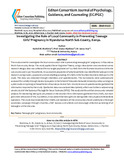| dc.description.abstract | The study aimed to investigate the local community’s role in preventing teenage girls’ pregnancy in Nyandarua
North Sub-county, Kenya. The study applied Social Cognitive Theory, using a descriptive cross-sectional survey
research design; data was collected from a target population of 14 chiefs from the fourteen locations within the
sub-county and 27,917 households. An accessible population of 569 households was identified to take part in the
research-using cluster, purposive and snowballing sampling. All chiefs in the fourteen locations took part in the
study. The data was obtained through interviews and questionnaires. The instruments were systematically
assessed for validity through review by experts in the School of Education Kabarak University and by carrying out
a pilot study comprising 30 households in Nyandarua Central Sub- County to ensure questionnaires gathered the
information required by the study. Qualitative data was analysed descriptively, which was further analysed using
version 24.0 of the Statistical Package for Social Sciences (SPSS). The study also found that community-initiated
projects for mentoring teen girls are present in the location from information gathered from chiefs, but most
girls were not aware of this. In addition, it was noted that teen girls are dating older men, especially Boda Boda
operators. The study recommended that Chiefs and members of the community should undertake a thorough
awareness campaign through churches, chief barazas and schools and encourage collective parenting of all
teenagers within the area | en_US |

